#racial slurs
Text
Non-offensive Historical terms for Black people in historical fiction
@pleasespellchimerical asked:
So writing historical fiction, with a white POV character. I'm not sure how to address race in the narration. I do have a Black main character, and I feel like it'd feel out of place to have the narrator refer to her as 'Black', that being a more modern term. Not sure how to do this without dipping into common historical terms that are considered racist today. Thoughts on how to handle this delicately, not pull readers out of the narrative? (fwiw, the POV character has a lot of respect for the Black character. The narration should show this)
There are non-offensive terms you can use, even in historical fiction. We can absolutely refer to Black people without slurs, and if slurs is all one can come up with, it’s time to go back to the drawing board. I cannot say which terms are best for your piece without knowing the time period, but hopefully the list below helps.
Historical terms to use for Black people (non-offensive)
African American documented as early as 1782 (documented in an ad in the Pennsylvania Journal). Note the identity isn’t accurate for non-American Black people.
African could refer to African people or “from 1722 as ‘of or pertaining to black Americans.’”
The place of origin could also be used. For example, “a Nigerian woman”
Africo-American documented as early as 1788.
People of Color documented as early as 1796 (with specific contexts, usually mixed people)
Afro American documented as early as 1817, 1831 (depending on source)
Black American documented as early as 1831
Black was used in Old English to refer to dark-skinned people. Black was not capitalized until recent years, so “She was a young black woman.” would make sense to say, though “She was a young Black woman.” is the better standard today, although not universally adopted. I personally prefer it capitalized.
Moor was used as early as the late 1400s for North African people, but had a somewhat flexible use where anyone visibly Black / Of African descent or the Afro Diaspora might be referred to or assumed as a Moor. Note, it has other meanings too, such as referring to Muslim people, but that doesn’t mean the person using it is going by the dictionary definition. Not really the way to go today, but okay in a historical setting (in my opinion).
Biracial (1860s), mixed race (1872), multiracial (1903) and multicultural (1940s) are also terms to refer to people of two or more races.
Occupation + description. Throughout history, many people have been referred to as their occupation. For example, the Carpenter, The Baker, the Blacksmith. Here’s an example of how you might go about using occupation and traits to identify a Black character in history. Here’s an example I came up with on the fly.
“You should go by Jerry’s. He’s the best blacksmith this town’s ever seen. Ya know, the real tall, dark-skinned, curly haired fellow. Family’s come here from Liberia.”
Offensive and less-sensitive terms for Black people
Blacks was used in plural more, but this is generally offensive today (Even writing it gives me **Thee ick*)
Colored was mostly used post-civil war until the mid 20th century, when it became unacceptable. This is not to be conflated with the South African Coloured ethnic group.
Negro/Negroes were also used as early as the 1550s. Capitalization became common in the early 20th century. I'm sure you know it is offensive today, though, admittedly, was not generally seen as such until around the 1960s, when Black replaced it. It does have its contexts, such as the trope “The Magical Negro” but going around using the term or calling someone that today is a lot different.
Mulatto referred to mixed people, generally Black and white, and is offensive today.
The N-word, in all its forms, is explicitly a slur, and there is absolutely no need to use it, especially in a casual manner, in your story. We’ve written about handling the N-word and alluding to it “if need be” but there are other ways to show racism and tension without dropping the word willy-nilly.
Deciding what to use, a modern perspective
I’m in favor of authors relying on the less offensive, more acceptable terms. Particularly, authors outside of the race. Seldom use the offensive terms except from actual direct quotes.
You do not have to use those offensive terms or could at least avoid using them in excess. I know quite famous stories do, but that doesn’t mean we have to so eagerly go that route today. Honestly, from teachers to school, and fellow non-Black students, it’s the modern day glee that people seem to get when they “get a chance to say it” that makes it worse and also makes me not want to give people the chance.
It goes back to historical accuracy only counting the most for an “authentic experience” when it means being able to use offensive terms or exclude BIPOC from stories. We’ve got to ask ourselves why we want to plaster certain words everywhere for the sake of accuracy when there are other just as accurate, acceptable words to use that hurt less people.
Disclaimer: Opinions may vary on these matters. But just because someone from the group cosigns something by stating they’re not offended by it, doesn’t mean a whole lot of others are okay with it and their perspectives are now invalid! Also, of course, how one handles the use of these words as a Black person has a different connotation and freedom on how they use them.
~Mod Colette
The colonial context
Since no country was mentioned, I’m going to add a bit about the vocabulary surrounding Black people during slavery, especially in the Caribbean. Although, Colette adds, if your Black characters are slaves, this begs the question why we always gotta be slaves.
At the time, there were words used to describe people based on the percentage of Black blood they had. Those are words you may find during your searches but I advise you not to use them. As you will realize if you dive a bit into this system, it looks like a classifying table. At the time, people were trying to lighten their descent and those words were used for some as a sort of rank. Louisiana being French for a time, those expressions were also seen there until the end of the 19th century.
The fractions I use were the number of Black ancestors someone had to have to be called accordingly.
Short-list here :
½ : mûlatre or mulatto
¼ or ⅛ : quarteron or métis (depending on the island, I’m thinking about Saint-Domingue, Martinique and Guadeloupe)
1/16 : mamelouk
¾ : griffe or capre
⅞ : sacatra
In Saint-Domingue, it could go down to 1/64, where people were considered sang-mêlé (mixed blood for literal translation, but “HP and the Half-Blood Prince” is translated “HP et le Prince de Sang-Mêlé” in French, so I guess this is another translation possibility).
-Lydie
Use the 3rd person narrative to your advantage
If you are intent on illustrating historical changes in terminology consider something as simple as showing the contrast between using “black” for first person character narration, but “Black” for 3rd person narrator omniscient.
-Marika
Add a disclaimer
I liked how this was addressed in the new American Girl books
it’s set in Harlem in the 1920’s and there’s a paragraph at the beginning that says “this book uses the common language of the time period and it’s not appropriate to use now”
-SK
More reading:
NYT: Use of ‘African-American’ Dates to Nation’s Early Days
The Etymology dictionary - great resource for historical fiction
Wikipedia: Person of Color
2K notes
·
View notes
Text
colonization wasn't started by the europeans in the 1500s.
so stop trying to demonize Europe and America for what they have don't that MANY cultures around the world have already done.
and yes using the term "colonizer" is a racial slur and stop suing it.
#colonization#colonialsm#colonies#european history#englands#uk#america#france#dutch#enlglish#white people#colonizer#racial slurs#rome#greece#asia
348 notes
·
View notes
Text
Romani YouTuber Florida.Florian reacting to Susan Sarandon using the word "gy*p*d" during the Blue Beetle red carpet:
This is a reminder to White leftists out there that you need to remember that you still have a lot of unlearning to do, never get complacent.
#not that susan sarandon was not problematic before this. she has been following a lot of dirtbag leftists and tankies#susan sarandon#anti susan sarandon#anti white leftist#racism#anti romani racism#racial slurs
88 notes
·
View notes
Text
When Dick gets in a fight at school after being called a racial slur, Bruce dives into researching about how to help his child deal with racism, learning a lot about his son's identity (and his own) in the process.
#dick grayson#bruce wayne#dick & bruce#richard grayson#batman#robin#batman and robin#dc comics#dc universe#light angst#identity#romani dick grayson#racial slurs#school fights#gotham#modern au#ethnicity#wayne manor#father son relationship#character development#family fluff#dick grayson fanfiction#dc fanfiction
26 notes
·
View notes
Text

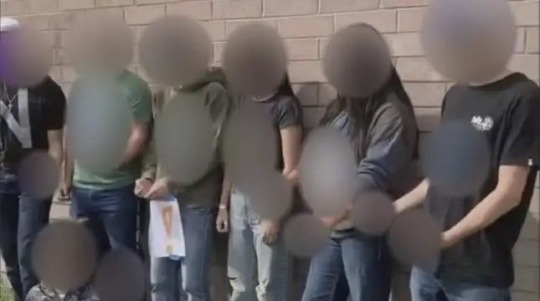
One parent told East Idaho News that she worried every day as the mother of mixed-race children. She called the post a “hate crime.”
“I’m ashamed and embarrassed,” she said. “My husband is one of two, maybe three African-Americans in this town.”
She said she was afraid to speak out, as: “I’m afraid if I said too much it would affect my job or my small business.”
Another mother said she was thinking about pulling her children from the school district, as she feared the offending students would not be disciplined properly.
“The reason why there’s hate in this community is because no one does anything about it. Period,” she said.
“These kids are old enough to know right from wrong. Parents, do better. But you can’t blame the parents for this, because some of them are 18. They’re adults. It’s disturbing.”

Google image search results: “students spell out the N word”
This (white kids smiling while posing for racist pictures) happens a lot, repeatedly, all over the country.
A stern talking to and a finger wag ain’t gonna do it here, fam. These students need to be expelled, with permanent marks on their high school transcripts. And I would expect the same punishment for students who posed for pictures making an Islamophobic or an antisemitic slur, a misogynistic, or a trans/homophobic slur. It’s weird how people immediately are concerned for “the futures” of young white racists being harmed, but somehow always seem to be much less worried for the futures of the Black students who their racism actively harms, both now *and* in the future.
Who gets tolerance and sympathy? And who gets repeatedly told to just deal with it?
What group of people are we constantly expected to forgive, and which group is forever doing the forgiving??
The forgiveness narrative and the “hate breeds hate” tropes are powerful and reliable tools of white supremacy.
And then, so-called “not racist” white people have the gall to wonder why things don’t seem to be changing or getting worse, racially.
The reason why racism persists in this country is because the people in charge of our banks, schools, social services, hospitals, police forces, etc—most often white people—never do anything about it.
DEI (Diversity, Equity, and Inclusion) and CRT (Critical Race Theory) need to be taught to students as young and as early as possible. And until we get several generations deep into that blanket training, white children and young adults need to be treated as harshly as Black children are for even the slightest of minor offenses, like “being disruptive” in classrooms.
#politics#racism#racial slurs#casual racism#white forgiveness#forgiveness narrative#idaho#learned racism#aversive racism#two americas#double standards
38 notes
·
View notes
Text
Half a year ago, I got myself involved in a thread which compared trans rights to gay rights and tried to make a case that, in terms of arguments for each, the issues are not as directly comparable as a lot of people seem to think. A lot of my perspective comes from a sort of an empathy I feel with the non- religiously conservative, non- radical feminist motivations for doubting some of what this social movement is pushing for, particularly with regard to its disconnect with how more traditional people view identity categories.
This portion of a recent interview on the YouTube channel Nonzero (see until 47:43) is a stunningly crystal-clear illustration of the attitude and motivation I was trying to describe at the time, so much so that I think it's instructive and kind of fascinating to watch, even if it's almost so extreme and ridiculous as to come across as parody. (Warning: a certain kind of non-conservative, non-TERFy transphobia, which I'll quote bits of below.)
The interviewee, Norman Finkelstein, feels violently averse to using "they/them" pronouns purely because it would be implicitly affirming what in his mind is an untruth. (Presumably he would not want to refer to a male-presenting student as "she" or a female-presenting student as "he", for a similar reason, but this doesn't directly come up.) He appears to have no other motive, but the motive of not liking to "play along" with someone else's factual untruth is plenty for him. There is no particular social conservatism evident in him; he states plainly that he's fine with androgyny, of people dressing/presenting any way they wish, and that stuff doesn't bother him in the slightest, because that doesn't involve saying things that are untrue. Politically and philosophically he is obviously left-leaning, pro-science, and non/anti-religious in most areas: he repeatedly likens affirming someone's gender identity to affirming that the world is flat or that climate change isn't real or "all the craziness you attribute to the Trump base". Not pronouncing things that imply a factual untruth or deny objective reality is sacred to him as a professor and an intellectual, is what he is saying.
Also, this:
I'm not insulting anyone. If I'm calling you a "he", it's not like I'm calling you the N word or I'm calling you a c*** or something. It's just a relatively stable identifier.
Notice how completely uncomprehending Finkelstein is of the notion that not affirming someone's claimed identity (on the basis of what he believes to be objective reality or established definitions of words) could possibly be an insult or convey lack of respect or qualify as dehumanizing treatment of someone else. That a refusal to affirm someone's claimed identity (on the basis that it denies objective reality) is somehow a form of dehumanization is a completely unfathomable concept to many.
Now I find Finkelstein's perspective flawed on at least half a dozen counts, and fallacious on a particular fundamental level in conflating different types of "objective facts" (something that Robert Wright, who takes a much more reasonable, kind, and open-minded agnostic view on all of this, gently tried to push back on him about). I do think Finkelstein had some good points later in the excerpt about not forcing jarring changes in language down everyone's throats -- this is how I feel about artificial and ugly terms like Latinx, for instance, and I would have had some issues with xie/xir and the like becoming widespread nonbinary pronouns -- but in my opinion these points can't be applied well to using singular "they" for nonbinary people. Moreover, Finkelstein comes across as hardly more than a crusty, curmudgeonly jackass throughout, one who proudly and stubbornly adheres to a disagreeable absolutist view and refuses to open his mind to where his defense of that view might be flawed.
(More minor point: in arguing that mispronouning someone isn't a form of insult, he compares it to factually saying someone's hair is white or that their muscular dystrophy will prevent them from running a 4-minute mile. But, while maybe "insult" or "dehumanization" wouldn't be the best way to describe these things, they are certainly rude in certain contexts: you probably shouldn't call attention to someone's hair being white if they are sensitive about aging, for instance. Similarly, calling a nonbinary but male-presenting person "he" is pretty unkind if they don't want to present as male and are sensitive about it. But Finkelstein clearly isn't the kind of person to prioritize others' feelings over his duty towards "objective reality" in this way.)
But I contend that this is simply an extreme and rather dickish version of how tons and tons of people think, because in terms of the history of social justice and civil rights movements, it is brand new for a movement to be so heavily based in the objective truth of internally-felt identities and accusing people of fundamental dehumanization when they refuse to affirm them. And yet, activist rhetoric sounds as if this is simply part of how identities always worked and what dehumanization always meant, rather than something that appeared on the scene just yesterday.
There is certainly still a major constituency of conservatively religious people who believe that everyone should only do with their bodies what their bodies were "created to do" or whatever, but conservative Christianity is very weakened in our culture since it lost the last major culture war, and I think a lot of people in that camp still also fall into the category of finding it incomprehensible nonsense to say that an identity category is whatever each of us says it is and that it's dehumanizing ever to imply otherwise. I believe it's simply a misconception to assume that the pushback against trans activism is comprised mainly of fundamentalists and TERFs. Norman Finkelstein is an (albeit extreme) example of someone who appears to be neither, and my perception at least in the US is that most people are neither, but that a great many Americans, if not a majority, don't really get the "identity is whatever you say it is" concept and at best are bemusedly humoring it as long as it doesn't get too much into their faces.
(On each day of this past weekend, I was in a different public place -- a bar restaurant and a coffee shop -- and overheard part of a conversation about how "the people in such-and-such social group over there all ask about and share pronouns and a bunch of them go by 'they'", and in context this wasn't being attacked in any way, but it was being treated as bemusing and only semi-comprehensible.)
As Tumblr user Bambamramfan once said, people (particularly scientific-minded, non-faith-y people) really don't like to assert things they don't actually believe (don't have time to look up the post right now; the way they phrased it was something like "Americans don't like to lie about what they believe" and it was in the context of lesser-of-two-evils voting, a topic on which I emphatically disagreed with Bambambramfan, but I consider that particular point to be wise). I wish this were more recognized in social justice activism communities in general, and both that more rhetoric were crafted and ideological assumptions were more carefully examined with it in mind.
I'll end by saying, as I've probably said before, that I'm not claiming just because certain ideological assumptions in trans right activism are fundamentally brand new, that they are wrong or shouldn't become adopted by the wider community. Lots of fundamental ideological assumptions that we are obviously better off for making the default, such as "people owning other people is a gross moral evil", were once brand new at least on a society-wide scale. What I complain about is activists completely refusing to acknowledge or even be aware of this novelty, and so refusing to critically examine it, to defend it on its own merits, or to meet others where they're at.
#trans issues#robert wright#transphobia cw#racial slurs#conservative christianity#terf ideology#social justice
108 notes
·
View notes
Text
This is what we mean about 'There's an unbelievable amount of racism in the ATSV fandom'
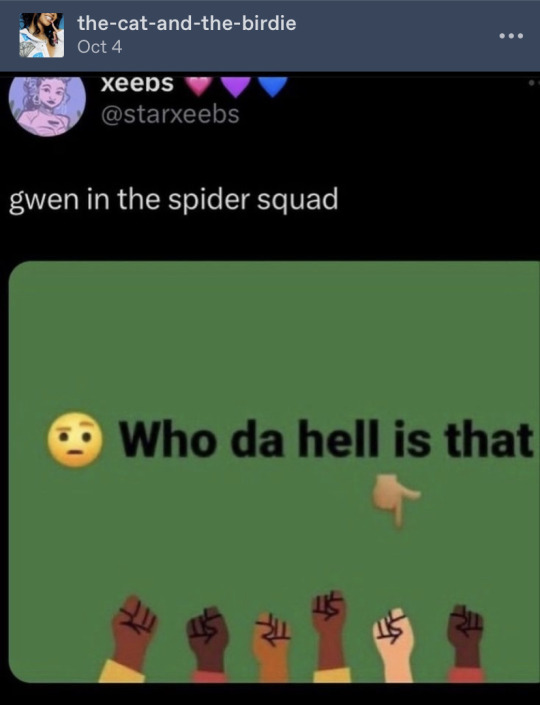

Racists be bold, cold, bitter and nasty as fuck!! Call them hoes Dunkin Donuts.
'Monkey' mfer call me Curious George cause I'll run up in a ⚪️ mans house and knock ALL this shit over rn!!! 😂😂
#also no censoring names#I don't protect racists#racism#antiblackness#spiderman#atsv#spider man#marvel#across the spiderverse#gwen Stacy#spider gwen#SpiderGwen#anti blackness#antiblack#slurs#racial slurs
43 notes
·
View notes
Note
womp womp nigger 🗣️‼️
anons are going off btw!! sorry to all the genuinely shy people, some cowards just cant come out and say their horrid stuff with their full chest
18 notes
·
View notes
Note
Lol retard imagine thinking anyone cares about you're retarded monkey ass culture that gave the world such innovations as the "Brazilian butt lift". Imagine living in a "country" renowned for its tranny prostitutes
If we're monkeys we're some damn smart monkeys, seeing as we've invented
Chest photofluorography for screening for tuberculosis
The Jatene procedure for arterial switch operation (a type of open heart surgery)
The first scorpion and spider antivenoms (in 1908 and 1925)
Caller ID
The wristwatch
Phone cards for payphones
Voting machines
Radiography (x-ray images)
Rice strainer
The Kinect for X-Box
3D cinema
The artificial heart
The most green light bulb in history
Havaianas flip flops
Automatic transmission
Typewriters
The solar bottle bulb
The first radio transmission
Two kinds of martial art (Brazilian Jiu-Jitsu and Capoeira)
The portable stereo cassette player
The Walkman
Hot air balloons
The first plane able to do unaided takeoff and flight (the Wright brother's plane needed a catapult)
Brain-Machine Interfaces
and discovered
The pathogen, vector, host, clinical manifestations and epidemiology for Chagas disease
The pathogen for epidemic typhus
The disease cycle for bilharzia
What about you? what have you invented?
Or are you not as smart as us monkeys?
#brazil#inventions#medicine#racism#bigotry#racial slurs#brazilian inventions#the walkman#radio#wristwatch#airplane#anti venom#caller id#did you know#little known fact#wright brothers#try again#latino america#latin america#south america
38 notes
·
View notes
Link
A Montreal-area mother is filing civil rights complaints against a junior hockey program and a local school board after her 13-year-son was allegedly targeted by racist insults and harassment from his peers.
Nadine Hart says her son, referred to as "JC" for privacy reasons, was regularly called the N-word by his teammates while enrolled in the Pro Action Hockey program at John Rennie High School in Pointe-Claire, Que.
When she brought these allegations to the school's attention, Hart claims they weren't taken seriously.
"Racial bullying and slurs were allowed to fester in that program due to the tolerance and inaction of the Pro Action Hockey and John Rennie High School. And it created a breeding ground for racism," she told reporters at a press conference Sunday.
Continue Reading.
Tagging: @politicsofcanada
#Quebec#Racism#Anti black racism#Hockey#cdnpoli#canada#canadian politics#canadian news#canadian#Ice Hockey#anti blackness#n word slur#racial slurs
84 notes
·
View notes
Text
not really sure how to feel after accidentally stumbling upon the account of one of the kids who joined in on the bandwagon of lying about me of being racist to my own people (chinese) while calling themself a fucking mayochink in their own profile.
#that's a lie i'm pissed tf off#for those who don't know a chink is an incredibly offensive racial slur against asians#idc if they were using it for reclamation purposes... the way they made up a narrative to accuse my friends of being racist against chinese#claiming that I had to be aware of the ways ppl are racist against chinese (which I confirmed that it wasn't after doing research)#and then flippantly calling themselves an insanely offensive slur against chinese people...be for fucking real#this feels like some kind of cruel joke except it's real#and people still think we're the ones who are racist#racial slurs
7 notes
·
View notes
Note
Hi! You said that the birthday Spotlights are made in favorite colours of birthday characters. May I offer a suggestions? Could you may be add their abo-world scent characteristics in there somewhere too? It would be so cool to have it there. Have a nice day! <3
Hi anon,
So about half of characters in the Birthday series actually aren't in the omegaverse* world, and therefore don't have scents. And of the ones who are, almost all of them are in the stories as AUs and not as main stories.
It's a cool idea though, I'll have a think about it going forward, maybe in the trivia section or a quick facts section, but most folks here aren't here for the Underline series, and were here for the Fae Tales stuff. Just like I'm not necessarily including everyone's alignment (Seelie/Unseelie) or fae species. These things are very specific to certain universes! The character birthdays definitely aren't just the Underline folks, and even when it is, those folks often started in stories that have nothing to do with the omegaverse series. :D
(The colours picked aren't the character's favourite colours! They're the colours I personally associate with the vibe/mood/energy of the character :D Nate doesn't love royal blue - he'd probably find it a bit overbearing as far as blues go - but I think it fits him best).
*Just a note to not use a/b/o without the forward slashes, because that's a really bad slur for Aboriginal people in Australia, and it's why I repeatedly use omegaverse or a/b/o! There are Indigenous folks from Australia who read my stuff and I'd just rather them not see the slur at all, thanks! :)
#asks and answers#underline the rainbow#underline the black#racial slurs#cw slurs#it's a cool idea but because it applies to so few characters i know me and i'd honestly forget to do it consistently#which is why i'm trying not to add too many like#story specific details when they don't apply across every single world or universe#because not all the characters have scent characteristics#tbh even characters like betas don't really either#which would leave Faber out sdlkfjas#administrator gwyn wants this in the queue
10 notes
·
View notes
Text
"Infertile women could, therefore, expect to be treated like barren sows and be passed from one unsuspecting buyer to the next. This was confirmed by a slaveholder who confessed to Northerner Frederick Olmsted that he had known a great many slave women to be sold off because they did not have children.45 Berry Clay confirmed that “a barren woman was separated from her husband and usually sold.”46 Planter interest in a slave woman’s offspring was long-range and often conflicted with that of a slave couple. For instance, Mary Reynold’s husband wanted to buy her from her master, but her master refused because he was “never one to sell any but old [n slur] who was past working in the fields and past their breeding time.”47 John Tayloe of Virginia was similar in this respect, except he sold females both before and after their childbearing years. Of the twenty-nine females he sold off his Mount Airy plantation between 1809 and 1828, four were small children, sixteen were girls aged nine to seventeen, and the remaining nine were mature women. No childbearing women were sold. An ex-slave summed it up: If a woman was a good breeder, “they was proud of her;” if not, they got rid of her."
- Ar'n't I a Woman? Revised addition by Deborah Gray White
#intersectional feminism#feminism#book quotations#feminist literature#feminist#feminist theory#intersectional feminism 101#intersectionality#intersectional politics#anti slavery#slavery tw#racism tw#racial slurs
43 notes
·
View notes
Photo


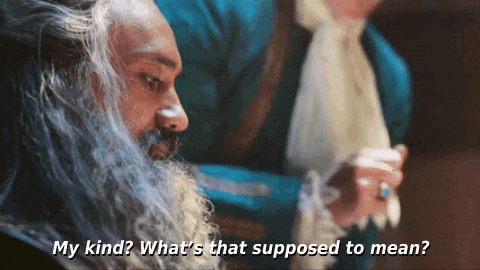

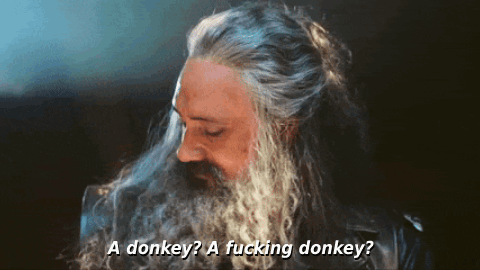
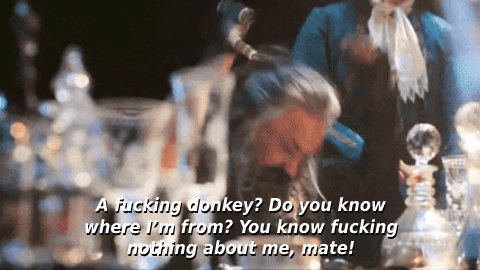




Our Flag Means Death (1x05): The Best Revenge is Dressing Well
#our flag means death#ofmd#edward teach#ed teach#blackbeard#stede bonnet#racism#racial slurs#ofmd 1x05#the best revenge is dressing well#stede i love you but you're missing the point#ed you are justified in your anger#and your outburst does not debase you#and also the coldness and dignity with which you order his death is everything
66 notes
·
View notes
Note
What's an amerikkkan bitch like you doing, kys nigger whore, stupid cunt deserves only to be raped like her useless whore of a coon mother

I'm black now?
#i'm not even from the south I never had biscuits and gravy until I was 19#really showing your true colors here anon#n word#racial slurs#chill out and go eat some jellied eel#or whatever nasty shit
22 notes
·
View notes